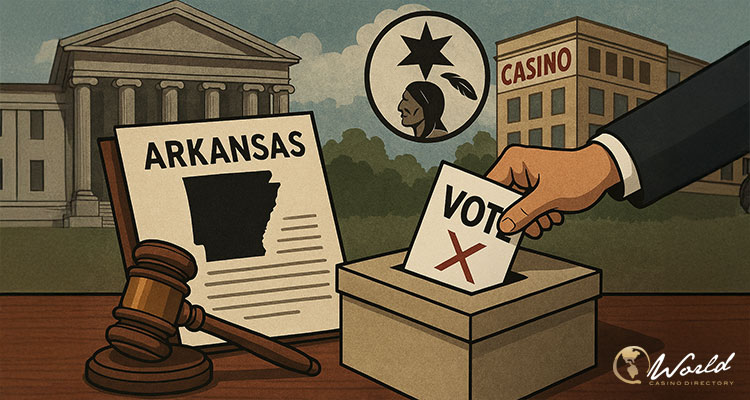The Cherokee Nation Businesses (CNB) suffered another legal setback as U.S. District Judge D.P. Marshall Jr. upheld the constitutional amendment blocking the construction of a casino in Pope County, Arkansas. The ruling, issued Thursday, August 28, confirmed that Amendment 104, which received nearly 56% voter approval in the November 2024 election, is consistent with constitutional law.
Court Upholds Voter-Approved Casino Ban
The amendment not only revoked the license issued to CNB but also required a countywide vote before any future casino license could be granted in Pope County. This decision followed months of legal arguments in which CNB claimed the amendment violated multiple constitutional protections, including the Due Process, Equal Protection, and Takings Clauses, as well as the Bill of Attainder Clause.
Attorney General Tim Griffin praised the outcome, stating, “I applaud today’s ruling, which sided with the State of Arkansas and the Arkansas Racing Commissioners on all issues.”
According to Kark, Judge Marshall’s 32-page opinion highlighted the complex history of casino gaming in Arkansas. The foundation was laid in 2018, when voters approved Amendment 100, authorizing licenses for casinos in Crittenden, Garland, Jefferson, and Pope counties. While Oaklawn Racing & Gaming in Hot Springs, Southland Casino Hotel in West Memphis, and Saracen Casino Resort in Pine Bluff quickly launched operations, Pope County’s path has been marked by prolonged legal and political battles.
Initially, the Pope County license went to Gulfside Casino Partnership before being reassigned to CNB and Legends Resort and Casino. However, opposition from the Choctaw Nation — which operates a casino just across the Oklahoma border — led to a series of legal challenges. In late 2023, the Arkansas Supreme Court nullified the license awarded to CNB, further complicating the process.
Despite the setbacks, CNB continued investing heavily in the project, purchasing 325 acres of land, hiring staff, and entering agreements with contractors and vendors. According to court findings, the company has spent more than $60 million in preparation for the proposed casino.
Marshall noted in his ruling that the Cherokee Nation took a “calculated business risk,” emphasizing that these agreements were executed before the state’s highest court invalidated the license. “The land is no doubt much less valuable now that Amendment 104 has scuttled casino gaming in Pope County,” he wrote.
Legal and Political Dimensions
Marshall dismissed claims under the Contract Clause and the Bill of Attainder Clause with prejudice, making them ineligible for refiling. Remaining claims, including those under the Takings Clause, were dismissed without prejudice, leaving the door open for CNB to seek remedies through state processes, such as the Arkansas State Claims Commission and General Assembly.
Regarding the Bill of Attainder argument, the court concluded that Amendment 104 did not specifically target CNB but broadly applied to any license issued in Pope County before the amendment took effect. Marshall clarified that the legislation “wholly eliminated casino gaming in Pope County” but did not restrict CNB from continuing operations at its 11 other casinos in Oklahoma and Mississippi.
The court also acknowledged that, while Amendment 104 effectively revoked the Pope County license, CNB retains a potential — albeit challenging — path to return through another constitutional amendment coupled with local voter approval.
CNB spokesperson Allison Burum said the company is reviewing the decision carefully. “We are reviewing all aspects of the judge’s ruling and considering next steps in the legal process,” Burum stated.


